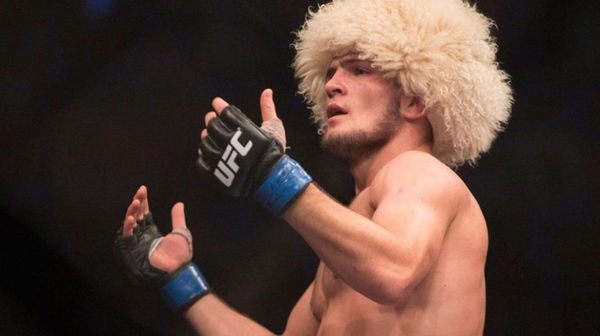

During Dominance MMA Media Day, UFC lightweight champion, Khabib Nurmagomedov revealed why he does not fight during the holy month of Ramadan.
Khabib Nurmagomedov (28-0), is one of the most dominant mixed martial artists on the planet. Throughout his career, “The Eagle” has destroyed his competition with his superior wrestling and grappling. He has victories over some of the best lightweights in the UFC. His last victory came in last September against Dustin Poirier.
The Dagestani will return to the octagon next month. He is set to face Tony Ferguson in his third title defence. Tony will be Khabib’s toughest challenge yet. “El Cucuy” is an excellent fighter, both on the feet as well as the ground. There is no place where Tony Ferguson is not good at.
ADVERTISEMENT
Article continues below this ad
The fight will go down on April 18, about a week before the Muslim holy month of Ramadan. During Ramadan, the followers of Islam practice fasting from sunrise to sunset. Khabib, who is a follower of Islam, does not prefer to fight during Ramadan. Here’s why.
Khabib Nurmagomedov describes his training during Ramadan
Training for a mixed martial arts match can be quite taxing on the body. An athlete has to go through rigorous training and weight cut. Fasting during such a crucial time can be detrimental to an athlete. It can significantly compromise them in their fight, especially if they can not rehydrate on time after weigh-ins.
ADVERTISEMENT
Article continues below this ad

Khabib revealed that he still trains during Ramadan, but not with the same intensity as he normally does.
“It’s very hard and very dangerous, too. All-day, you don’t drink and you don’t eat. Injuries can come. That’s why we (don’t have) too much contact, and without sparring. It’s still hard.”
ADVERTISEMENT
Article continues below this ad
“Ramadan, I take like a little bit off training – but I’m still (MMA) training, too. I spend this time with family, parents, go to the mosque, pray, and day (to) night fasting. And, of course, we’re training, too.”
The Eagle said that he spends this time with his family and at the mosque. Khabib also stated the time needed to recover from the entire process. He said that an athlete requires at least 40-45 days to recover from the entire process. This process involves adapting to the changes in food eating patterns.

